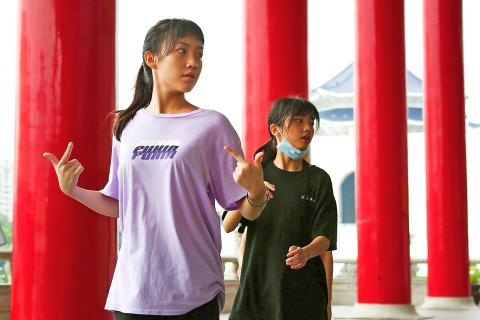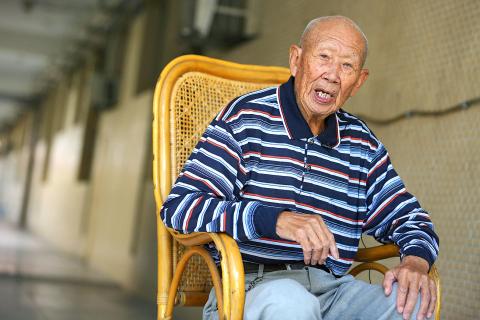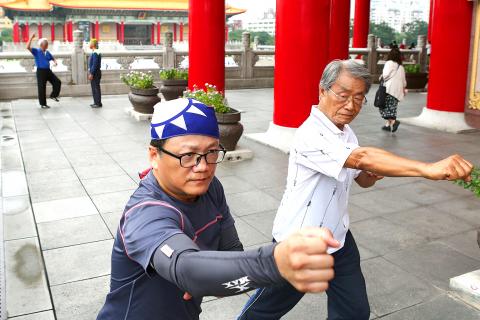Communist China’s creation seven decades ago irrevocably changed Taiwan, but Beijing’s huge celebrations this week are to be met with a collective shrug in a nation where people increasingly see themselves as distinct from China.
After the People’s Republic of China (PRC) was declared on Oct. 1, 1949, its rival, the Republic of China (ROC), set up in Taiwan — where Chiang Kai-shek’s (蔣介石) defeated Chinese Nationalist Party (KMT) fled to and imposed their will.
Taiwan remains a sore point to this day among Chinese Communist Party (CCP) leaders in Beijing — viewed as a missing piece of a geographical puzzle that must one day be completed.

Photo: Hsu Tsun-hsu / AFP
However, for younger Taiwanese such as Doris Cheng, the idea that her homeland is a part of China is anathema.
“Taiwan is a country,” said the 16-year-old, while taking a break from practicing hip-hop dance moves with friends in Taipei’s Liberty Square. “Taiwan has autonomy, a government, our own people and territory.”
Fellow dancer Stephanie Fu, an 18-year-old college student, agreed.

Photo: Hsu Tsun-hsu / AFP
“I think it is natural that we see ourselves as Taiwanese, we were not born in China after all,” she said.
“There’s no sense of belonging to China,” she said. “Culturally we may be Chinese and similar, but there are still differences.”
The CCP has never controlled Taiwan and historically Chinese governments have exerted nominal control for only a fraction of the island’s history.

Photo:Hsu Tsun-hsu / AFP
However, Chinese President Xi Jinping (習近平) has made no secret of his desire to see Taiwan brought into China’s fold.
In a speech on Jan. 2, he described Taiwan’s absorption as “inevitable” and said the “problem” must not be put off for the next generation to handle.
Yet that increasingly assertive rhetoric from Beijing has done little to win over Taiwanese, who have now experienced more than two decades of democracy.
According to a regular poll by National Chengchi University, those who identify as solely Taiwanese has rocketed from 18 percent in 1992 to 55 percent last year.
Those who see themselves as “Taiwanese and Chinese” has hovered around 40 percent, while those who identify as Chinese only has plummeted from one-quarter of the population to 4 percent, the poll found.
The emergence of a growing Taiwanese identity is a headache for Beijing’s plans, but many older Taiwanese still see themselves as part of a wider Chinese family.
On the other side of Liberty Square, 56-year-old David Chang was teaching a martial arts class, a ROC flag bandana on his head.
“We have been taught where we came from, where our blood flowed. Your nationality can change, but our blood flows from China,” Chang said.
However, being Chinese does not mean belonging to Beijing, he said.
“To my generation, the concept of country is stronger. We see the ROC as our country. This was how I was taught,” Chang added.
Hsiang Pi-chien, 100, is one of a dwindling number of people who remember the birth of the PRC.
At his retirement home for Nationalist Army veterans in Tainan he recalled how he and his fellow soldiers had spent weeks retreating from Mao Zedong’s (毛澤東) communist forces.
It was 39 years before he returned to his village home when relations between the two sides finally began to thaw. Almost all of his family were dead.
“Back then China was so poor,” he said. “Compared to Taiwan it was like heaven and earth, there’s no comparison.”
Taiwan had undergone an economic miracle and was emerging from decades of repressive martial law, moving toward the vibrant democracy it would become.
China has since transformed itself into the world’s second-largest economy and a military power, with the one-party state as repressive and more in control than ever.
It is a remarkable transition Beijing will place front and center at this week’s celebrations.
Taiwan heads to the polls on Jan. 11 and the relationship with China will dominate campaigning, but whoever wins, it is clear that CCP leaders will have an increasingly tough time persuading skeptical younger generations of Taiwanese — especially as Beijing takes a hard line to pro-democracy protests in Hong Kong.
“I feel it is the freedom of speech,” said Fu, when asked to describe what separates the two neighbors. “Unlike us, they are unable to express themselves freely with some things, especially when it comes to politics.”
With that, she returned to her dance class.

Civil society groups yesterday protested outside the Legislative Yuan, decrying Chinese Nationalist Party (KMT) efforts to pass three major bills that they said would seriously harm Taiwan’s democracy, and called to oust KMT caucus whip Fu Kun-chi (傅?萁). It was the second night of the three-day “Bluebird wintertime action” protests in Taipei, with organizers announcing that 8,000 people attended. Organized by Taiwan Citizen Front, the Economic Democracy Union (EDU) and a coalition of civil groups, about 6,000 people began a demonstration in front of KMT party headquarters in Taipei on Wednesday, organizers said. For the third day, the organizers asked people to assemble

Taipei is participating in Osaka’s Festival of Lights this year, with a 3m-tall bubble tea light installation symbolizing Taiwan’s bubble tea culture. The installation is designed as a bubble tea cup and features illustrations of Taipei’s iconic landmarks, such as Taipei 101, the Red House and North Gate, as well as soup dumplings and the matchmaking deity the Old Man Under the Moon (月下老人), affectionately known as Yue Lao (月老). Taipei and Osaka have collaborated closely on tourism and culture since Taipei first participated in the festival in 2018, the Taipei City Department of Information and Tourism said. In February, Osaka represented

POOR IMPLEMENTATION: Teachers welcomed the suspension, saying that the scheme disrupted school schedules, quality of learning and the milk market A policy to offer free milk to all school-age children nationwide is to be suspended next year due to multiple problems arising from implementation of the policy, the Executive Yuan announced yesterday. The policy was designed to increase the calcium intake of school-age children in Taiwan by drinking milk, as more than 80 percent drink less than 240ml per day. The recommended amount is 480ml. It was also implemented to help Taiwanese dairy farmers counter competition from fresh milk produced in New Zealand, which is to be imported to Taiwan tariff-free next year when the Agreement Between New Zealand and

Taiwanese professional baseball should update sports stadiums and boost engagement to enhance fans’ experience, Chinese Professional Baseball League (CPBL) commissioner Tsai Chi-chang (蔡其昌) told the Liberty Times (sister paper of the Taipei Times) in an interview on Friday. The league has urged Farglory Group and the Taipei City Government to improve the Taipei Dome’s outdated equipment, including relatively rudimentary television and sound systems, and poor technology, he said. The Tokyo Dome has markedly better television and sound systems, despite being 30 years old, because its managers continually upgraded its equipment, Tsai said. In contrast, the Taipei Dome lacked even a room for referees